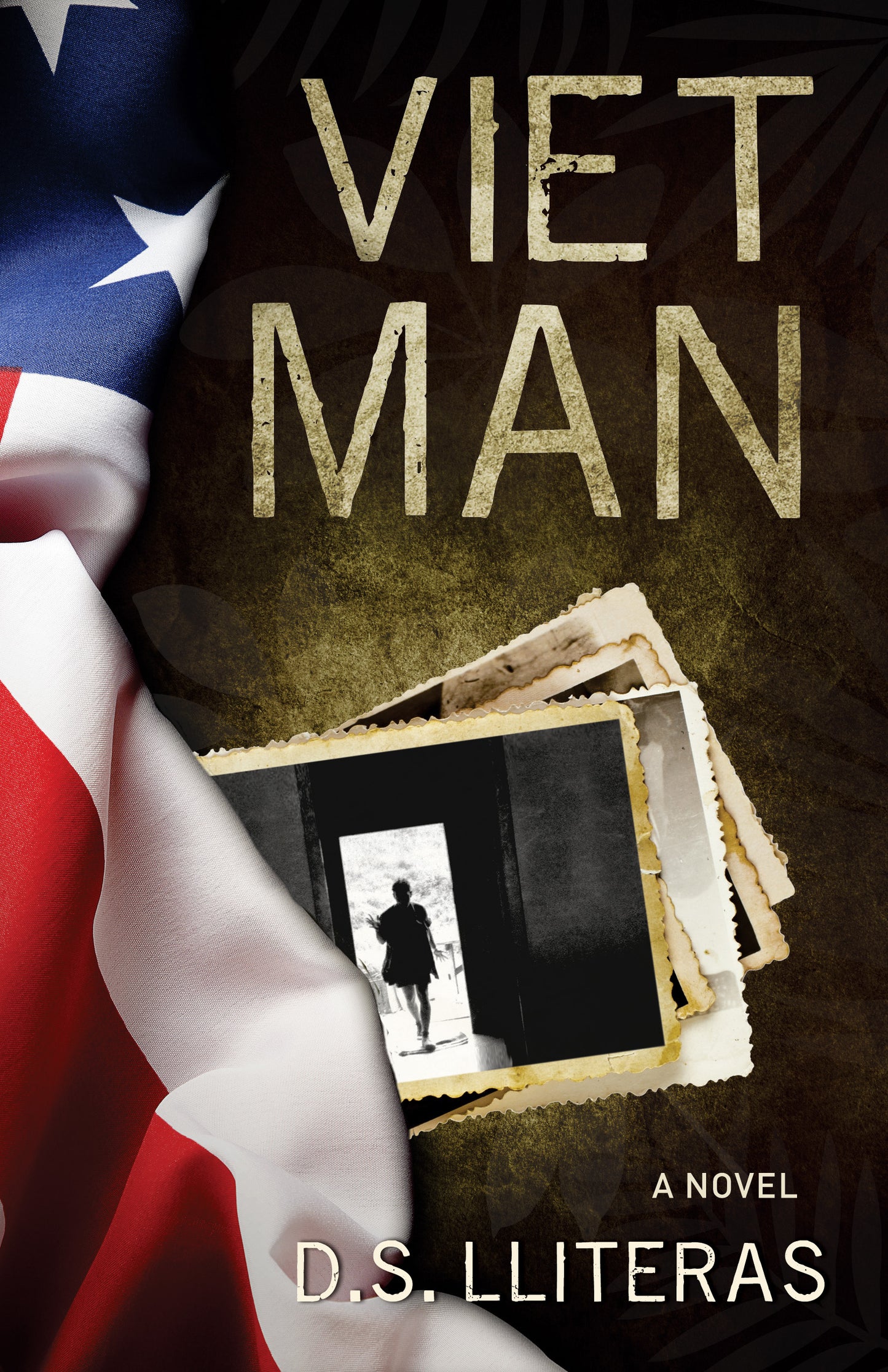* Winner of the Military Writers Society of America (MWSA) Gold Medal for Best Literary Fiction
Viet Man is about the transformation of a young man who enlisted in the Navy during the Viet Nam War, was trained as a hospital corpsman, was transferred into the Marine Corps, then sent to Viet Nam where he joined the elite First Recon.
It is a first person narrative of alternating episodes experienced in the rear and in the bush. In the rear, Doc encounters a straw-haired mid-western farm boy who shows him how to prepare a meal of long-rats, and Loopie, a Puerto Rican from the Bronx who shares a guilt-torn confession that borders on confabulation. In the bush, Doc experiences the terror of accidentally releasing a live grenade among his men, of rushing to rescue a wounded marine, and of sharing a quiet conversation in a bunker with Trang, a South Vietnamese soldier.
After being assigned to the Recon Dive Team and attending the Navy diving school in the Philip-pines, he returns to Viet Nam were he engages in numerous combat dives and river operations.
At the end of his tour, he is processed out of the military. And upon his return to his hometown as a veteran, he faces a jarring reception of insolence, indifference, and fragmented flashbacks. In Viet Man, D. S. Lliteras unlocks the inner mystery of a man’s combat experience. It is poetic and haunting, authentic and amusing. It is a story told by a man who ultimately survives the war and returns to his homeland, but another country will
forever dwell in his soul.
D. S. Lliteras is the author of fourteen books that have received national and international acclaim. His short stories and poetry have appeared in numerous national and international magazines, journals, and anthologies. He lives in Montgomery, Alabama with his wife and author, Kathleen Touchstone.
"What Viet Man offers us is not only a work worthy of literary accolades, but a tribute to a time when the world was confused and tenuous—and we have never been able to understand why, until now, where between the covers of this book we find our own Wilfred Owens. Highly Recommended."
From Literary Aficionado
by Grady Harp
D.S. Lliteras has looked at the 20th century and found it wanting. Or rather, the audience for excellent literautre has yet to recognize his importance so perhaps it is we, the wanters, who are still lost, searching for a voice to define the last fifty or so years. His credentials are impressive: he has written twelve books since 1992, his first novels were biblical in nature and while they gained accolades from the press it was only when he decided to enter and related that part of his psyche that was most vulnerable that his books burst into significance. Lliteras joined the US Navy after high school and became a corpseman assigned to the USMC First Reconaissance Battalion First Marine Division near DaNang, winning a Bronze Star for valor. He was trained as a diver and further endured the Vietnam War in that role. Following his discharge from the USN he gained his BA and MA in Fine Arts from Florida State University and worked as a theatrical director until 1979, resigning to become a merchant sailor. In 1981 he aligned with the USN as a deep sea diving and salvage officer, following which he resigned his naval commission and became a professional firefighter. And yes, all of this is pertinent to the content of this, his newest and most brilliant book.
There are many novels written about all aspects of the Vietnam War--some famous for recreating all aspects of the Vietnam War--some famous for recreating the atmosphere of that major mistake in US history both in the ill-defined battle ground of Vietnam and in the rebellion by those in the US who either violently protested the war or ran way from it to Canada--but to date this reader (who served in Vietnam from 1968-1970 in the same region as the author assigned by the USN to the USMC, etc) has not encountered a novel that breathes the humid musky air of that jungle war so accurately as does Lliteras' Viet Man: even the title is telling--about the mixed emotion of participating in that war. As a corpsman Lliteras takes us through his arrival in Danang, his preparation for recon search and destroy missions with the Marines, his response to every aspect of that robbed year of service, the terror of near death episodes, the ever-respect paranoia of not knowing where the 'enemy' was, the physical exhaustion of patrols and combat enounters, yet he also shows a very human aspect of the interdependence among his marines, the humor, the use of drugs and other escape hatches to breathe outside the line of fire if only for moments, and the bonding with men on whom to depend for protection while he provided medical readiness for the results of engagement.
But one aspect (of many) that makes his book so rich and so real is his extraordinarily literate ability to place his descriptions of thoughts poetically while relating the acrid details of the war zone thinking in piercingly penetrating, sharp prose. He compares 'Patrol Reports' (set on gray sheets and all in military terminology) with his relating from a corpsman's mind and memory what really happened. This attention to both feelings and observed details is what makes the books more credible--and it is that combination that makes his eventual return to the US to find a country that seems to disregard him as a meaningless non-existent piece of unnecessary reminder dung that we all felt when returning "home" to the country for whom we had placed our lives on hold in a zone of persistent cerebral damage we are still feeling--it is that aspect that has been missing.
What Viet Man offers us is not only a work worth of literary accolades, but a tribute to a time when the world was confused and tenuous--as we have never been able to understand why, until now, where between the covers of this book we find our own Wilfred Owen. Highly Recommended.
“I definitely like his [Lliteras'] writing style. His books really make me think. He's definitely an author worth checking out!”
"[An] absorbing, gritty military novel . . . [Lliteras] wins the reader's admiration with his loyalty to and compassion for his battle-mauled patients . . . [he] spins his first-person narrative with laconic prose and acerbic wit . . . [an] accomplished novel."
"[Viet Man] is forcefully written, a nice mix of style and subject, and it has much to say about life and death and war and peace . . . Fine war fiction from a writer who's been there."
"Viet Man is truth . . . Lliteras’s ability to paint a visual image, to put a thousand meanings into one succinct and profound turn of a phrase, has you walking alongside him, trying to survive, too. The Vietnam Lliteras effectively sketches for you to see, is not a pleasant one. It’s drug-filled, tense, raw, and aching. It’s all there to see, but you feel it in your soul . . . weaves in the dichotomy of potential death and fragile life in phrases that keep punching you between the eyes . . . Viet Man step[s] you back from the canvas – not to judge – but to get a broader view."
"[A] very different picture of war from the heroic stories of military glory Americans are used to."
"[Vietman War] veterans have finally received approval and encouragement to talk about their experiences, only to find that they cannot easily communicate their feelings to those who were not there with them. When an author succeeds in carrying his readers directly into the jungles, the rice paddies, the strangely impersonal hootches and dusty base camps, the world of drugs and blank-eyed mama-sans, the impact of his words makes us gasp for breath and struggle for understanding.
D.S. Lliteras has managed to do exactly that in his tersely-worded literary novel, Viet Man. His narrator has no name other than 'Doc.' . . . As readers, we follow him through his first patrols, his first kill, his first visit to the local red light district, the growing recognition of his own mortality. When he describes a scene, his details are specific and honest. We don't just learn what's going on; we see it and smell it, feel it and hear it. In peaceful moments he speaks to us in sentences and paragraphs. When danger threatens or fear overwhelms, his mental state retreats into disjointed phrases or single words. We learn about his broken romance back home only when something triggers his own memories. And in the end, we accompany him when he returns stateside, only to find that those at home cannot begin to understand that he now lives in a different world than the one they know.
This is a powerful novel, eloquent while using the simplest of vocabulary and poetic in its clear-eyed imagery. Read it. Your understanding of this tumultuous period of our history will be forever enriched."





